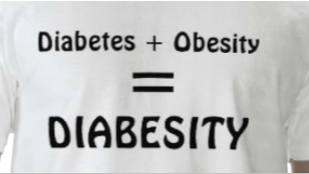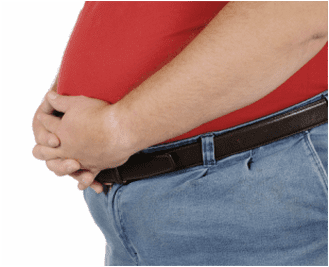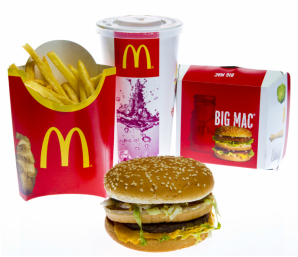From Diabesity to Diabetes

Although the word diabesity is a simple amalgam of diabetes and obesity, it needs to be taken seriously. Diabesity is a potentially deadly disease that more than one in three of us have and although it makes many of us fat and ill, most of us don’t know we have it.
Diabesity begins with mild insulin resistance and ends with full-blown type-2 diabetes. Weight gain, elevated blood sugar levels, high blood pressure and high levels of triglycerides and LDL (bad) cholesterol are among the typical early signs. And although there are certain genetic components, we can all influence diabesity through what we eat and drink, through our lifestyles and by taking moderate levels of exercise.
Diabesity begins with mild insulin resistance and ends with full-blown type-2 diabetes. Weight gain, elevated blood sugar levels, high blood pressure and high levels of triglycerides and LDL (bad) cholesterol are among the typical early signs. And although there are certain genetic components, we can all influence diabesity through what we eat and drink, through our lifestyles and by taking moderate levels of exercise.
JUst 18 minutes to get really well informed? Click below:
Dr Sarah Hallberg explains why we should stop using medicine to treat food; and that pre-diabetes (diabesity), is caused by an overdose of carbohydrates, which means cutting back on carbs in your diet and eating more fat..
Foods you will need to avoidThere's a growing body of opinion that supports cutting out ready made, commercial foods and switching to home cooking. That being said, we need to get more specific to provide everyday guidance. So; in no particular order, the three main 'diabesity' culprits are:
Why avoid starch, fructose & seed oils?1/ Fructose - Normal white sugar contains a 50:50 mix of glucose and fructose and glucose, in small doses is an important nutrient. But fructose is a quite different story. Fructose, found naturally in fruits and vegetables is infamously also the major constituent of industrially produced high-fructose corn syrup (HFCS). Glucose is rapidly absorbed into the bloodstream but fructose goes directly to the liver where it is converted to fat. In excess, it can lead to non-alcoholic fatty liver disease which is directly linked to both diabetes and obesity.
Dr. Robert H. Lustig, who wrote the New York Times bestseller, “Pure, White and Deadly”, explains that fructose is toxic and that it “causes damage, provides no benefit and is sent directly to the liver to be detoxified (and turned into fat) so that it doesn’t harm the body”. Fructose also forms toxic compounds called Advanced Glycation End-Products (AGEs) which damage DNA, speed up the aging process, cause high blood pressure and lead to kidney disease. It is up to 10 times more likely to produce AGEs than glucose. Fruit, when eaten in moderation is still good for you even though its sweet(!), but you are advised to reduce the fructose rich juices, stop the sweet sodas and above all avoid foods which include HFCS on the label! For the record, a large-scale study of nurses recently published by the British Medical Association involving researchers from the UK, USA and Singapore found that people who ate whole fruit, especially blueberries, grapes and apples, were less likely to get type 2 diabetes (obesity-related) than those who drank fruit juice. 2/ Cereal grains - Wheat, corn, rice, barley, oats etc. have become the staple crops of our modern diet. They are at the heart of the low-fat, high-carbohydrate diet agenda promoted by government bodies responsible for dietary guidelines and interestingly, still recommended by most Diabetes Associations around the world. As an observation, their edicts and recommendations inevitably play on the perception that whole grains are healthy. Yet we are not alone: many animals, including monkeys and apes have never adapted to eating cereal grains (grasses in their original form) and humans have only been eating them for the past 10,000 years or less. The natural defences developed by these plants and grasses include toxins which:
3/ Industrial seed oils - Industrial seed oils (corn, cottonseed, soybean, safflower, sunflower, etc.) have only recently become part of our human diet. Well-meaning heart and diabetes authorities along with countless doctors and nutritionists began promoting them as “heart-healthy” alternatives to saturated fat which became cursed because of its supposed links to cholesterol and heart conditions. Not surprisingly, consumption of these seed oils has more than doubled over the last 50 years. These Industrial seed oils which are rich in Omega 6 but low in Omega 3, have been shown increasingly by researchers to play a considerable role in today’s obesity epidemic. They lead to inflammation, insulin resistance and impaired leptin signalling (directly contributing to diabetes). They also interfere with thyroid function by blocking the binding of thyroid hormone to its receptors leading to increased fat accumulation and a less efficient metabolism. In some countries such as Belgium, you can still buy French fries cooked in beef tallow (aka fat or dripping) in many of the country's restaurants and 'fritures'. Even there however, most of the big chains have moved on to soy, corn and sunflower oil. McDonald's frying oilIsn't it ironic that McDonald’s fries used to be cooked in a blend of healthy beef fat (tallow) and vegetable oil, even though that oil was most likely hydrogenated for longer life (= bad trans fats). Then in the late 1980's, just like many other fast-food companies, they were forced to switch to pure vegetable oil out of concern that the saturated fat in beef tallow would raise cholesterol levels.
Now on the website, McDonald's admits to using: “a Canola blend cooking oil, which does contain some soybean oil”. Hydrogenated trans fats have been removed they say, but a return to healthy beef tallow is not - as yet - on the cards! At least their Indian customers will be thanking them since fries cooked in sacred beef oil would be a complete no-no.
|
Type-2 diabetesType 2 diabetes is a disease where your pancreas pumps out too much insulin simply because your diet is full of empty carb-rich calories such as sugars and carbohydrates like bread, pasta, rice, and potatoes. It is a disease of carbohydrate intolerance. Over time, your cells become resistant to these high amounts of insulin and demand more and more just to keep up with your body’s attempts to balance out the high blood sugar levels.
And so it goes; you develop Insulin Resistance which over time, leads to premature aging and is associated with diseases of the heart, cancer and dementia. You get hungry and your rising insulin levels make you even hungrier, increasing weight gain and causing inflammation and oxidative stress. The usual medical solution is to treat the high blood sugar levels whereas the real solution lies in reducing your insulin levels. That’s where low-carbohydrate diets play their role again, because the good news is that for most of us, insulin resistance and diabesity are usually completely reversible. Sugar is flammable
A footnote on sugar: Sugar is concentrated energy! It is flammable and burns easily if you expose it to a flame, so the handling of sugar presents a risk in manufacturing facilities. The 2008 Georgia sugar refinery explosion resulted in 14 deaths with 40 being injured. The fire spread rapidly due to the level of sugar dust contamination throughout the facility. A specialized foam truck had to be called in to put out the fires, because the sugar inside was burning at such a high temperature. Dietary toxins?
Robert Lustig calls fructose a toxin although when most people hear the word “toxin”, they think of chemicals like pesticides, heavy metals or other industrial pollutants. But everything, even water, can be toxic at high doses. So quantity and frequency of consumption are each important. It can be argued that all three, namely Fructose, cereals and industrially produced seed oils, are dietary toxins and what they cause is inflammation. Nowadays, people talk of ‘diabesity’ as an autoimmune, inflammatory disease and as we are learning, anything that causes inflammation is a potential risk factor. Notably, new evidence is now causing dementia to be added to this list of illnesses brought on at least in part by our modern junk-food diets. |
Trans fats? on their way out.
So McDonald's have already eliminated trans fats from their foods. But you’ll still find them, usually labelled something like ‘partially hydrogenated vegetable oil', in crackers, cookies and snack foods etc. Vegetable shortening, used in the making of pastry for example has usually contained trans fats as have all margarines until recently.
The first trans fats were not really designed for human consumption. Messrs Proctor and Gamble were using cotton seed oil to make candles but the newly discovered electricity industry wasn’t exactly helping their business. Their chemists re-invented hydrogenated cotton seed oil in the form of Crisco and launched on the US market in 1911. Trex was one of the famous early brands in the UK (introduced in the 1930’s). They became popular because they were cheaper than butter, neutral in smell compared to lard and obtained good baking results. Becaus eof growing health concerns, they have now largely replaced the trans fats with something else from the lab – “interesterified fat”; but that’s another story.
The Food and Drug Administration is now close to banning them but not so long ago, with the anti-cholesterol bandwagon really in-swing, they were seen as a healthier choice. In 1986, for instance, the American Center for Science in the Public Interest (CSPI), described Burger King's switch to partially hydrogenated oils as "a great boon to Americans' arteries." Well meaning health activists and nutritionists lobbied hard to persuade fast-food chains to drop palm oil or beef fat (both containing saturated fat) and replace them with partially hydrogenated oil – by then coming mostly from soy beans. But by the mid-1990’s nutritionists began to see that trans fats were not so good for you which has led manufacturers like the potato crisp industry to switch to the new 'healthy' – sunflower oil.
The first trans fats were not really designed for human consumption. Messrs Proctor and Gamble were using cotton seed oil to make candles but the newly discovered electricity industry wasn’t exactly helping their business. Their chemists re-invented hydrogenated cotton seed oil in the form of Crisco and launched on the US market in 1911. Trex was one of the famous early brands in the UK (introduced in the 1930’s). They became popular because they were cheaper than butter, neutral in smell compared to lard and obtained good baking results. Becaus eof growing health concerns, they have now largely replaced the trans fats with something else from the lab – “interesterified fat”; but that’s another story.
The Food and Drug Administration is now close to banning them but not so long ago, with the anti-cholesterol bandwagon really in-swing, they were seen as a healthier choice. In 1986, for instance, the American Center for Science in the Public Interest (CSPI), described Burger King's switch to partially hydrogenated oils as "a great boon to Americans' arteries." Well meaning health activists and nutritionists lobbied hard to persuade fast-food chains to drop palm oil or beef fat (both containing saturated fat) and replace them with partially hydrogenated oil – by then coming mostly from soy beans. But by the mid-1990’s nutritionists began to see that trans fats were not so good for you which has led manufacturers like the potato crisp industry to switch to the new 'healthy' – sunflower oil.
Summary of diabesity
Diabesity is a modern disease and removing these 'toxins' prevents and can even reverse diabetes. Both diabetes and obesity are extremely rare in hunter-gatherer cultures and two recent studies have shown that a paleolithic diet (free of cereal grains, seed oils and excessive fructose) can produce dramatic improvements in cardiovascular and metabolic markers. Dr. Staffan Lindeberg’s (University of Lund Sweden) initial study with 29 people sufferring from heart disease demonstrated:
Diabesity is a modern disease and removing these 'toxins' prevents and can even reverse diabetes. Both diabetes and obesity are extremely rare in hunter-gatherer cultures and two recent studies have shown that a paleolithic diet (free of cereal grains, seed oils and excessive fructose) can produce dramatic improvements in cardiovascular and metabolic markers. Dr. Staffan Lindeberg’s (University of Lund Sweden) initial study with 29 people sufferring from heart disease demonstrated:
- Weight reduction, with greater fat loss in the midsection
- Voluntary calorific reduction of 25%
- Improvement in glucose tolerance



